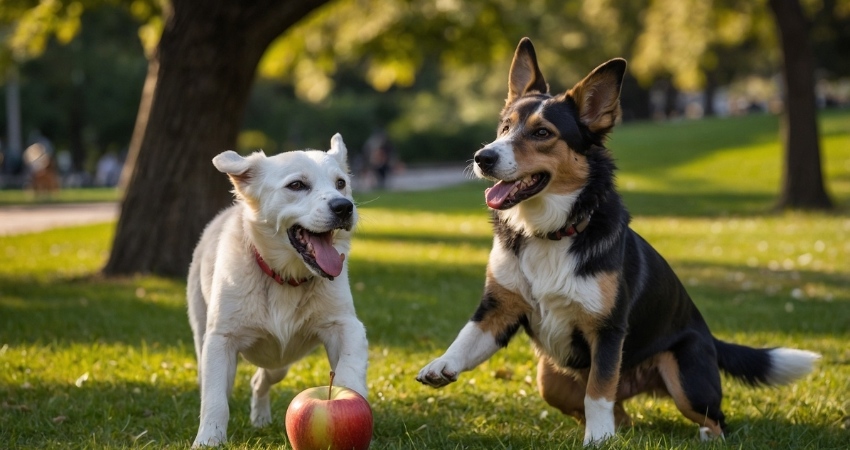
Can dogs eat apples? It’s a question that pops up for many pet owners looking to share their favorite snacks with their furry companions. Offering your dog human food can feel like a special treat, but it’s always good to know what’s safe and what’s not.
Apples are often seen as a healthy option, but before you toss your dog a slice, there are a few things you should consider. Not every part of the apple is dog-friendly, and moderation is key when it comes to introducing new foods.
Curious about how apples can fit into your dog’s diet and the best way to serve them? Keep reading to find out all the tips and tricks!
Can Dogs Eat Apples?
Yes, dogs can safely eat apples! Before sharing this tasty treat, it’s crucial to prepare it properly. Always remove the core and seeds, as they contain cyanide, which can be toxic to dogs. Cutting the apple into small, manageable pieces will also help prevent choking and make it easier for your furry friend to enjoy.
When introducing apples to your dog’s diet, start with just a few small slices. This allows you to monitor how they react to the new food. Some dogs may love the crunch, while others might be hesitant at first, so patience is key during this introduction.
It’s also essential to wash the apple thoroughly before serving. This ensures that any pesticides or harmful residues are removed, making it safer for your pet. With these simple precautions, apples can be a fun and healthy addition to your dog’s snack repertoire!
Quick Overview: Can Dogs Eat Apples?
Summary of Content Apples are safe for dogs, not toxic, and generally not allergenic. They are species-appropriate when offered in small amounts and moderation. |
What About Puppies?

Puppies can also enjoy apples, but it’s essential to ensure they don’t consume more than 10% of their daily caloric intake from this fruit. Since they are in a growth phase, it’s important to pay attention to what they eat.
Before adding apples to your puppy’s diet, consult your veterinarian for guidance on the appropriate amount. This helps avoid digestive issues and ensures you’re making the best choice for your pup’s health.
When introducing apples to a puppy, start with small slices to see how they react. The question “can dogs eat apples?” applies to them as well, and gradual introduction is essential to determine if your puppy enjoys the flavor.
The Benefits of Apples for Dogs
AdIncorporating apples into your dog’s diet can provide several health benefits. Apples are packed with fiber, vitamins, minerals, and other essential nutrients. Here are some of the benefits:
- Supports hormone synthesis: The nutrients in apples can aid in the production of hormones that regulate various bodily functions, contributing to your dog’s overall health and vitality. This is especially important for maintaining energy levels and a healthy metabolism;
- Improves eye health and helps prevent night blindness: Apples contain antioxidants, including vitamin A, which supports eye health and can help prevent conditions like night blindness. Keeping your dog’s vision sharp is crucial for their quality of life, especially as they age;
- Protects veins and arteries: The antioxidants found in apples may help reduce the risk of heart disease by supporting the health of blood vessels. Regularly incorporating apples into your dog’s diet can contribute to better cardiovascular health over time;
- Promotes oral hygiene: Chewing on apples can help reduce plaque and tartar buildup on your dog’s teeth, promoting better oral hygiene. The natural crunchiness of apples can aid in cleaning teeth while providing a delicious treat;
- Delays brain aging: The antioxidants in apples may help combat oxidative stress, potentially delaying the effects of aging on your dog’s brain. This can contribute to maintaining cognitive function as your pet grows older;
- Maintains healthy skin and coat: The vitamins and hydration provided by apples can contribute to a shiny coat and healthy skin. A well-nourished dog not only looks good but also feels great, enhancing their overall comfort and happiness.
Preparing Apples for Your Dog
To prepare apples for your dog safely, start by washing the fruit thoroughly. This removes pesticides and dirt, ensuring a clean treat. Remember to remove the core, stem, and seeds, as they contain cyanide, which can be toxic to dogs.
Consider peeling the apple to make it easier for your dog to digest, especially if they are new to eating fruit. Cutting the apple into small slices or pieces will help prevent choking and make it more manageable for your furry friend.
If you’re asking, “can dogs eat apples?” the answer is yes! By following these preparation tips, you can turn apples into a nutritious and tasty snack that your dog will enjoy.
Other Fruits Dogs Can Eat

If your dog enjoys apples, there are several other fruits that are also safe for them:
Final Thoughts on Apples for Dogs
Apples can be a delicious and healthy treat for your dog, packed with vitamins and nutrients that contribute to their overall well-being. When served correctly, they offer a fun way to add variety to your pet’s diet. Just remember that moderation is key to ensuring your furry friend stays safe and happy.
To prepare apples safely, wash them thoroughly and remove the core, stem, and seeds. Then, cut the apples into manageable pieces for your dog.
This helps prevent any choking hazards and ensures your dog enjoys the fruit without risks. If you’re still asking, “can dogs eat apples?” you can feel confident knowing that they can when prepared the right way.
Now that you know how to safely introduce apples to your dog’s diet, why not try it out? Share your experiences and tell us about your dog’s favorite way to enjoy this tasty fruit!
FAQ: Common Questions About Apples for Dogs
Can dogs eat green apples?
Yes, dogs can eat green apples! These apples are safe and can offer a slightly tart flavor that some dogs may enjoy. Just remember to remove the seeds and core before serving.
Can dogs eat apple cores?
No, dogs should not eat apple cores. The seeds found in the core contain cyanide, which is toxic to dogs. Always remove the core before giving apples to your pet to ensure their safety.
Can dogs eat apple skin?
Yes, dogs can eat apple skin, but it’s best to wash the apple thoroughly to remove any pesticides. Some dogs may find the skin harder to digest, so consider peeling the apple if your dog is new to eating fruits.
Can dogs eat apple pie?
It’s not recommended for dogs to eat apple pie. Apple pie often contains sugar, spices, and other ingredients that can be harmful to dogs. Stick to fresh apples as a healthier treat option.
Can dogs eat crab apples?
Crab apples are not toxic to dogs, but they can be very sour and may cause digestive upset if consumed in large quantities. While they are not ideal, if you’re wondering, “can dogs eat apples?” regular apples are a much better choice.
Can dogs eat dried apples?
Dogs can eat dried apples in moderation, but make sure they don’t contain added sugars or preservatives. Always check the ingredient list before giving your dog dried apples, and remember that fresh apples are generally the better choice.
